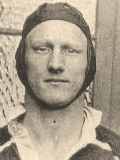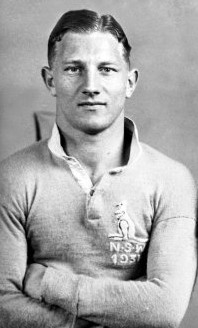Dave Brown (rugby league, born 1913) facts for kids
 |
|||||||||||||||||||||||||||||||||||||||||||||||||||||||||||||||||||||||
|
Personal information
|
|||||||||||||||||||||||||||||||||||||||||||||||||||||||||||||||||||||||
|---|---|---|---|---|---|---|---|---|---|---|---|---|---|---|---|---|---|---|---|---|---|---|---|---|---|---|---|---|---|---|---|---|---|---|---|---|---|---|---|---|---|---|---|---|---|---|---|---|---|---|---|---|---|---|---|---|---|---|---|---|---|---|---|---|---|---|---|---|---|---|---|
| Full name | David Michael Brown | ||||||||||||||||||||||||||||||||||||||||||||||||||||||||||||||||||||||
| Born | 4 April 1913 Sydney, New South Wales, Australia |
||||||||||||||||||||||||||||||||||||||||||||||||||||||||||||||||||||||
| Died | 23 February 1974 (aged 60) Earlwood, New South Wales, Australia |
||||||||||||||||||||||||||||||||||||||||||||||||||||||||||||||||||||||
|
Playing information
|
|||||||||||||||||||||||||||||||||||||||||||||||||||||||||||||||||||||||
| Position | Centre | ||||||||||||||||||||||||||||||||||||||||||||||||||||||||||||||||||||||
|
|||||||||||||||||||||||||||||||||||||||||||||||||||||||||||||||||||||||
|
Coaching information
|
|||||||||||||||||||||||||||||||||||||||||||||||||||||||||||||||||||||||
|
|||||||||||||||||||||||||||||||||||||||||||||||||||||||||||||||||||||||
David Michael Brown (born 4 April 1913 – died 23 February 1974) was one of Australia's greatest rugby league players. He was known for his amazing skills and for wearing a special headgear. Many people admired him during the 1930s.
Dave Brown won two championships with the Easts team. He scored so many points, tries, and goals that he set many records. Some of these records might never be broken! Because of his incredible talent, people called him "the Bradman of league." Donald Bradman was a famous cricketer known for his high scores.
In 2003, Dave Brown was added to the Australian Rugby League Hall of Fame. This is a special place for the best players in the sport. In 2008, he was chosen for the New South Wales rugby league team of the century. This means he was one of the best players from New South Wales in 100 years. In 2018, he became a Rugby League Immortal, which is the highest honor in rugby league.
Contents
Early Life and Challenges
Dave Brown was born in Sydney, New South Wales, Australia. He faced some challenges when he was young. He lost the top of his thumb in a lawn-mowing accident. Later, he badly broke his arm while playing football at school. This injury affected his right hand, making him lose the use of two fingers.
Even with these setbacks, Dave was a great all-around sportsman. He was a top tennis player, a champion junior surfer, and a good cricketer. He went to Waverley College in Sydney. There, he was coached by Arthur Hennessy, who was Australia's first ever rugby league test captain.
A Rising Star in Rugby League
Dave Brown was a strong player who played as a centre. He joined the Eastern Suburbs club right after school. He quickly moved up to play in the top team after only a few games in lower grades.
The next year, when he was just 18, Dave was chosen to play for his state, New South Wales. He played in three games against Queensland. Around this time, he got a virus from swimming that made him lose all his hair. After that, he started wearing a hairpiece to cover his baldness.
In 1932, at just 19 years old, Dave Brown became the captain of the Eastern Suburbs club. The next year, he was chosen for the 1933–34 Kangaroo tour of Great Britain. This was a big trip where Australian players traveled to Great Britain to play games.
During the boat trip, one of his teammates threw his hairpiece out of a porthole! After this, Dave started wearing his famous headgear instead. On the tour, he played in 32 matches, including all 3 important Test games. He scored 285 points, which was the most points ever scored by an Australian player on a tour at that time. He scored 19 tries and kicked 114 goals. In one special game played in France on a snow-covered field, Dave scored 6 tries and kicked 9 goals, getting a total of 36 points!
Setting New Records
When he returned to Sydney, Dave Brown led the Easts team. They had many talented players. In 1934, they finished first in the regular season. However, they lost the championship game to Western Suburbs.
The 1935 season was Dave Brown's best year. The Easts team lost only one match and won their fifth championship. In just 15 club matches, Dave scored an amazing 244 points! This included 38 tries and 65 goals. His record of 38 tries in a season still stands today. Only one other player, Newtown winger Ray Preston, has scored more than 30 tries in a season (34 tries in 1954).
In one game against Canterbury-Bankstown, Dave Brown scored a record 45 points (5 tries, 15 goals). The 15 goals he kicked in that game is also a record for goals in a single match. In another game against Canterbury-Bankstown, he scored 38 points (6 tries, 10 goals). He also scored 26 points against North Sydney and 32 points against Balmain. Dave Brown was a true point-scoring wizard! In 1935, he scored a total of 385 points across all his games for Eastern Suburbs and representative teams. What's even more impressive is that in 1934, 1935, and 1936, he wasn't the only player kicking goals for his team. His teammate Jack Beaton often took the easier shots.
On 28 September 1935, when he was just 22 years old, Dave Brown became the youngest ever Australian captain. He led his country to win a series against New Zealand. In 1936, Easts won the NSWRL season title again, and this time they didn't lose a single game!
Playing in England and Final Years
At the end of the 1936 season, Dave Brown decided to play for an English rugby league club called Warrington. He signed a four-year contract.
He played as a right-centre (number 3) for Warrington. He scored two tries in Warrington's 8-4 win against Barrow in the 1937–38 Lancashire County Cup Final. This game was played at Central Park in Wigan on 23 October 1937.
Dave Brown played 93 matches for the Warrington Wolves, scoring 326 points (48 tries and 91 goals). In a cup semi-final against St Helens, he kicked what he thought was his best goal ever. The scores were tied at 2-all near the end of the game. Warrington got a penalty near the touch-line. Dave took the shot from far away and kicked it perfectly between the posts. This gave Warrington a 4–2 win and sent them to the Cup final!
However, Dave didn't have the same level of success in England as he did in Australia. He decided to end his contract early and returned home.
Back in Australia, Dave rejoined the Eastern Suburbs club and played in the rest of the 1939 season. In 1940, Dave Brown became both the captain and coach of the team. Easts finished at the top of the league. Even though Dave got a leg injury, the team managed to win another premiership.
1941 was Dave Brown's last season as a player. Easts finished first in the regular season again, but they lost to St George in the championship game. Dave Brown was 29 years old when he announced his retirement after that match.
After Football
After he stopped playing, Dave Brown worked to promote rugby league in schools. He also spent time coaching and helping the game grow in South Africa.
Dave Brown, "The Bradman of League," passed away from cancer in 1974, just before his 61st birthday. He left behind his family and his amazing records in rugby league.
Awards and Honors
In 2003, Dave Brown was honored by being inducted into the Australian Rugby League Hall of Fame. For many years, the award for the best player in the Grand Final was called the Dave Brown Medal.
Dave Brown was also named as one of the centres, alongside Dally Messenger, in the Eastern Suburbs club's greatest team of all time. There is also a special plaque in the Walk of Honour at the Sydney Cricket Ground that celebrates his career.
In February 2008, Dave Brown was included in the list of Australia's 100 Greatest Players from 1908 to 2007. This list was created to celebrate 100 years of rugby league in Australia. In 2008, he was also named in New South Wales' rugby league team of the century.
In 2018, Dave Brown joined other famous players like Dally Messenger and Frank Burge by being inducted as a Rugby League Immortal. This is a very special honor, and he was inducted along with more recent greats like Norm Provan and Mal Meninga.
 | Delilah Pierce |
 | Gordon Parks |
 | Augusta Savage |
 | Charles Ethan Porter |


